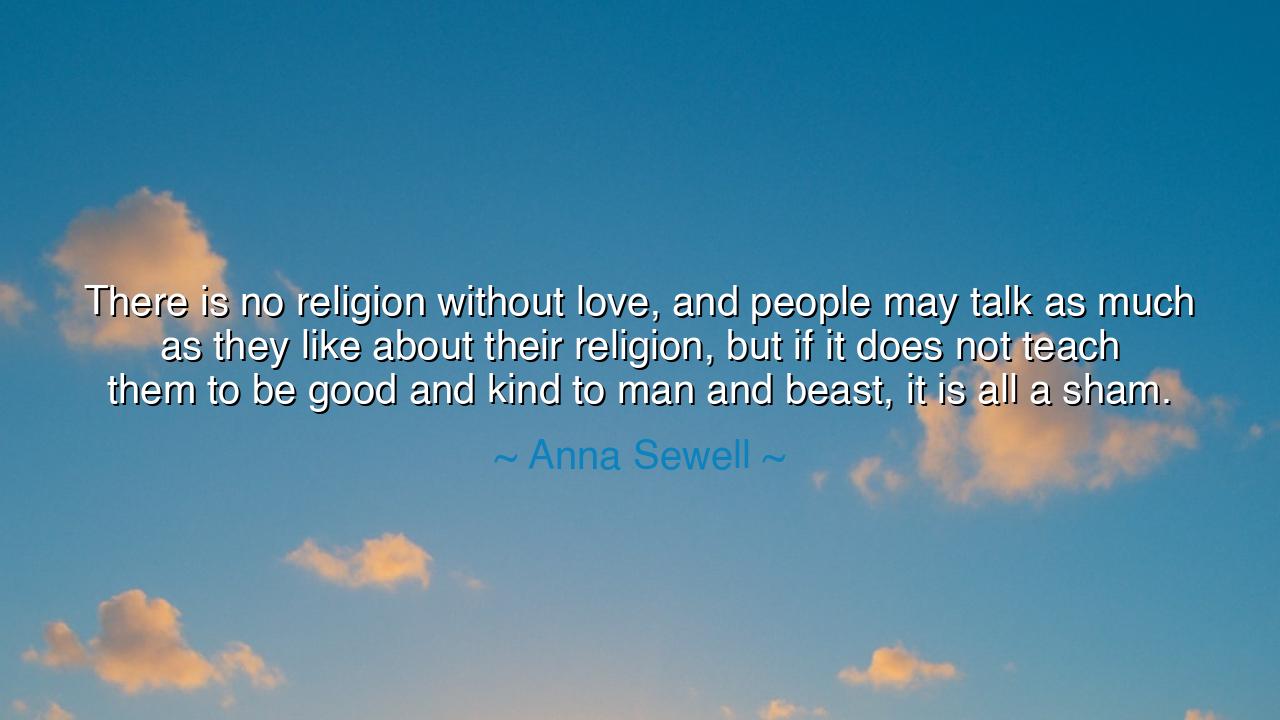
There is no religion without love, and people may talk as much as
There is no religion without love, and people may talk as much as they like about their religion, but if it does not teach them to be good and kind to man and beast, it is all a sham.






Hear, O seekers of truth and compassion, the words of Anna Sewell, who declared: “There is no religion without love, and people may talk as much as they like about their religion, but if it does not teach them to be good and kind to man and beast, it is all a sham.” In this utterance lies a sword that cuts through hypocrisy and a light that illuminates the heart of faith. She reminds us that the essence of the sacred is not ritual nor doctrine, not outward appearance nor endless speech, but love—a love that extends to every creature that walks, flies, or breathes upon the earth.
The origin of these words is found in Sewell’s life and in her most famous work, Black Beauty, a novel that did more to advance compassion toward animals than many sermons of her age. Living in 19th-century England, she witnessed cruelty disguised as custom—horses beaten for labor, children overworked, the poor trampled under the weight of society’s pride. Against this, she raised her voice with simplicity and power: no faith that allows cruelty is true faith, no religion that excuses harshness is worthy of reverence. Her words came not from idle thought, but from a life lived in suffering and a heart devoted to mercy.
Consider the meaning of her wisdom. Love is not an ornament to religion, it is its foundation. If a man prays fervently but despises his neighbor, his prayer is hollow. If a woman sings hymns but strikes the innocent, her song is noise without music. True religion must teach kindness, not only to fellow humans but to the silent creatures entrusted to our care. The test of faith is not in how loudly one proclaims it, but in how gently one lives it.
History offers witness to this truth. Recall the life of Saint Francis of Assisi, who called the birds his brothers and the beasts his companions, seeing in all life the reflection of the Creator. His religion was not only in chanting psalms, but in caring for lepers, feeding the hungry, and blessing the animals. He lived the truth Sewell proclaimed: that without love for both man and beast, faith is a sham. His memory endures not because of lofty words, but because of the depth of his compassion.
Contrast this with darker times when faith was used to justify cruelty—the burning of heretics, the enslavement of peoples, the slaughter of innocents in the name of heaven. Such acts, though cloaked in sacred language, were empty of love, and thus, by Sewell’s measure, no religion at all. They remind us that words and rituals are easily corrupted when divorced from compassion. Faith without kindness is not faith but idolatry of power.
The meaning for our time is urgent. In an age where many boast of their traditions while showing little mercy, Sewell’s words rise like a prophet’s cry. Religion is not proved by temples or scriptures alone, but by the treatment of the weak, the voiceless, and the vulnerable. How do we treat the poor? The stranger? The animals who cannot defend themselves? These are the questions that reveal whether our faith is alive or whether it is but a hollow mask.
The lesson for us is clear. Examine your faith by your kindness. Do not measure your devotion by how much you speak, but by how much you love. Be gentle to those around you; extend mercy even to the smallest creature. Let your faith be seen not in argument, but in service, in generosity, in tenderness. And remember always that the truest form of worship is not words lifted to heaven, but hands extended in compassion upon the earth.
Thus let the words of Anna Sewell endure: “There is no religion without love… if it does not teach kindness to man and beast, it is all a sham.” May they echo through generations as a call to strip away pretense and embrace the heart of the divine: love, pure and simple, steadfast and strong, reaching from the highest heaven to the humblest creature on earth.






AAdministratorAdministrator
Welcome, honored guests. Please leave a comment, we will respond soon